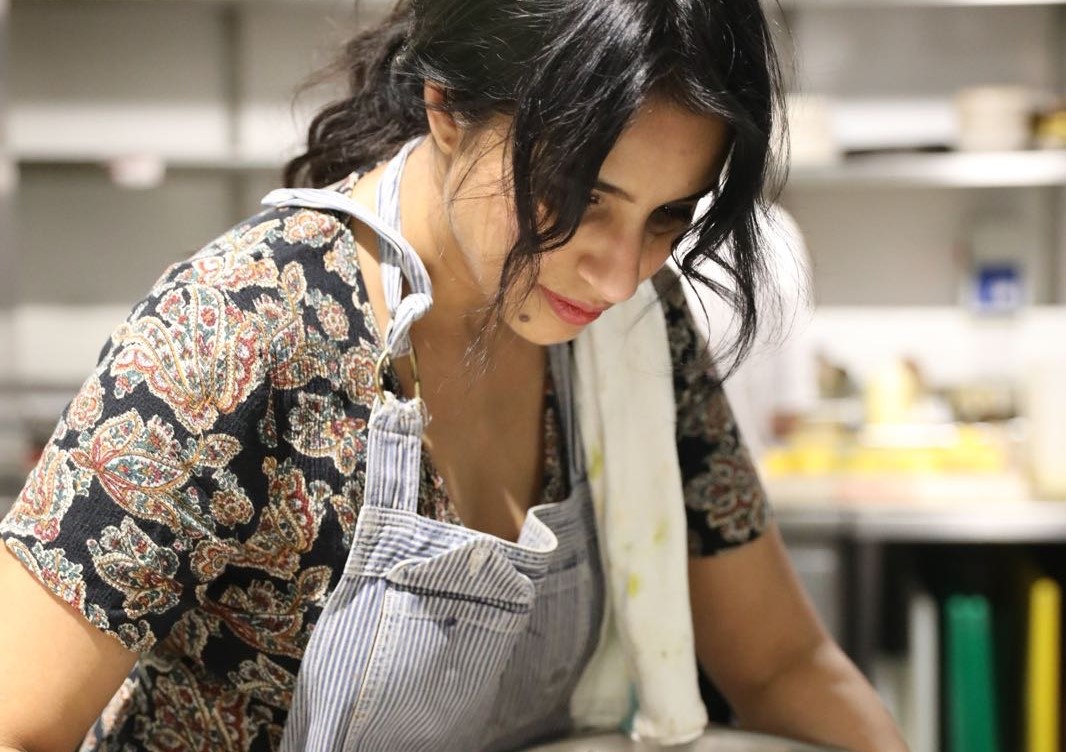 Ravinder Bhoghal by Rahil Ahmad
Ravinder Bhoghal by Rahil Ahmad
Diversity: Good Food’s Missing Ingredient
London is a city buzzing with diversity. But does our sustainable food scene reflect this vibrant mix of cultures? Mecca Ibrahim spoke to women working in the food industry to find out.
The Black Lives Matter Movement has forced us all to look at uncomfortable issues. We may feel that London is a natural melting pot, with all of its many voices given equal weight, but this is often not the case. And what effect does that have on the sustainability of our food system?
SUSTAINABILITY IS UNIVERSAL
Ravinder Bhogal is an award-winning food writer and founder of the Marylebone restaurant, Jikoni, inspired by the rich shared flavours of South Asia, the Far East, the Middle East, East Africa and Britain. Ravinder explains that “as well as celebrating our cultural similarities and the intricacies of our differences” she also wants to create a world that is kinder and greener. “All our energy is from sustainable sources. We try our utmost to make sure nothing is wasted and all our packaging for our home delivery brand Comfort and Joy is 100% home compostable.”
Elainea Emmott is a London based chef and food and protest photographer who is interested in our ability to use science and culture to improve our food system. Her philosophy can be attributed to her Caribbean culture. “Due to our heritage and our parents’ economic status, we had to use ALL of the animal and plants to make ends meet,” she says. “My aim is to have zero waste or as near to it as possible.”
ADDRESSING ELITISM
Some fundamentals for a sustainable food system may not always seem possible in inner cities. Growing spaces such as allotments have long waiting lists and are in scarce supply. Cooking from scratch, nose-to-tail eating, zero-waste and buying organically are often seen as the preserve of the White middle class. When asked about the pursuit of sustainable eating, Elainea comments: “As a single mum I am aware that this sounds very elitist. If you don’t have much money and most of what you have is going on bills and a roof over your head, then this can come across as being quite preachy.”
These preconceptions of sustainability bring to light the need for more cooking and story sharing, as if we look to our elders’ style of cooking across all heritages, they used all these techniques to survive in times less plentiful. This can only happen if role models from diverse ethnicities are given their much-needed voice and accurately portrayed in the media. “We see when we are seen. Being part of the TV show Crazy Delicious on Netflix was important to me as it enabled me to tell my own story; show others excellence and inventiveness in food and food from my heritage.” explains Elainea.
Lorraine Copes is a senior leader within the hospitality sector and has set up the new not-for-profit organisation BAME in Hospitality. She echoes the need for greater visibility and appreciation of Caribbean, African and Asian foods and this means for those who cook those cuisines too. She sighs. “I have literally always had to search high and low for success stories, role models, and emerging talents, because they are not visible in the media.”
ENDING CULTURAL APPROPRIATION
Sustainability extends beyond our physical environment to our food culture. The industry should pay more credit and respect to the original cultures from where dishes are borrowed. “Our philosophy at Jikoni is one of pluralism and diversity. In the food we cook we are breaking down borders. We celebrate immigrant food and make a statement about celebrating our cultural similarities, and the intricacies of our differences,” says Ravinder.
Lorraine sees learning and development as one way of levelling the playing field for people from Black, Asian or ethnic minority backgrounds who may not be from privileged backgrounds. Her organisation aims to conduct research into greater understanding, and support organisations to create better-informed strategies to accelerate racial equality.
Many organisations used Blackout Tuesday as a reaction to Black Lives Matter, but more is required beyond ticking boxes. The food industry needs to look at how it can be anti-racist every day. “Centuries of systemic racism aren’t going to go because one day you ‘woke up’,” says Elainea.
Inherently, a good sustainable food system should be founded on opportunities for all, regardless of financial and physical traits, including ethnicity and skin colour. For people to not feel marginalised, there needs to be daily recognition of the integral role the black, Asian and minority ethnic communities’ play in food history, current cuisines and the sustainable food industry.
Mecca Ibrahim is co-founder of Women in the Food Industry
www.womeninthefoodindustry.com
@women_food_wifi
@bamehospitality
@cookinboots
@Jikonilondon
@elaineaemmott
London Food Link: London Food Link brings together community food enterprises and projects that are working to make good food accessible to everyone in London to help create a healthy, sustainable and ethical food system for all.
Sustain
The Green House
244-254 Cambridge Heath Road
London E2 9DA
020 3559 6777
sustain@sustainweb.org
Sustain advocates food and agriculture policies and practices that enhance the health and welfare of people and animals, improve the working and living environment, promote equity and enrich society and culture.
© Sustain 2025
Registered charity (no. 1018643)
Data privacy & cookies
Icons by Icons8